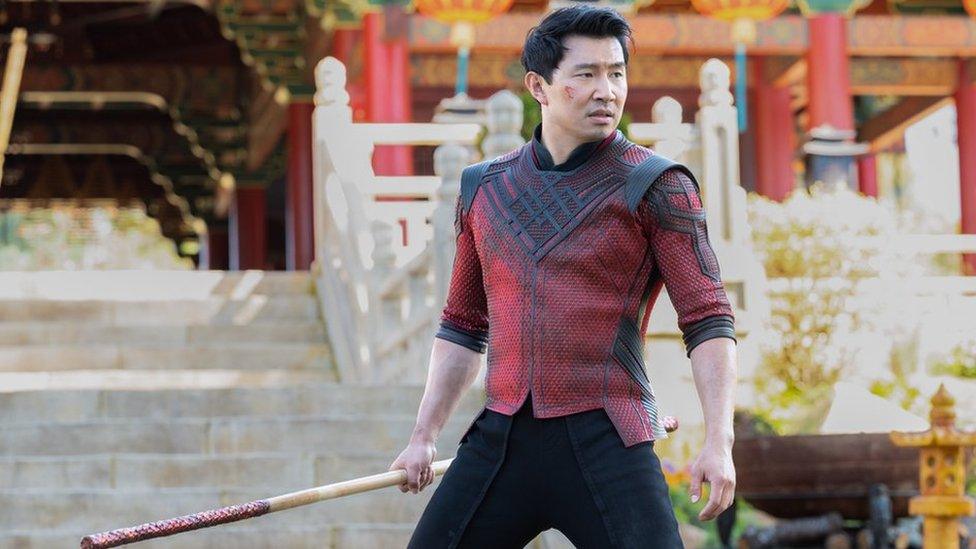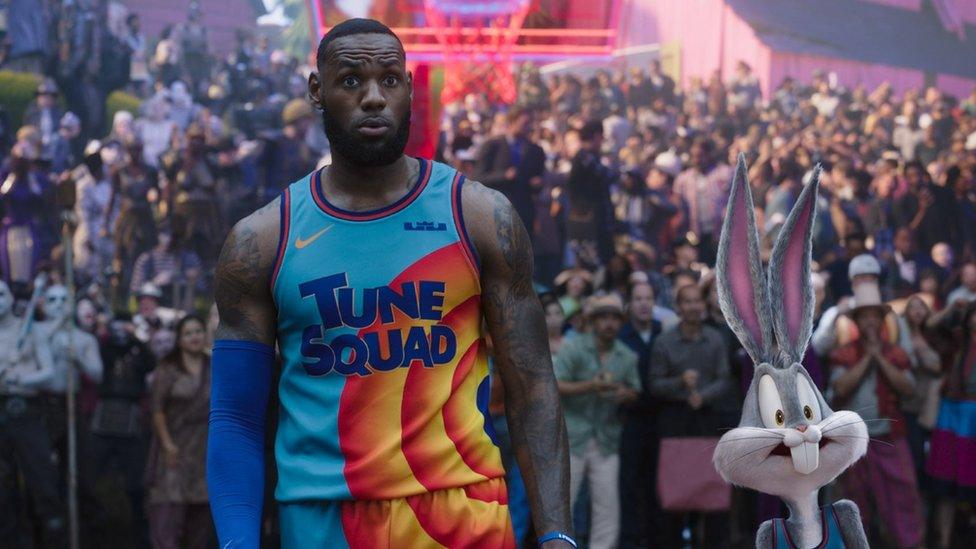Shang-Chi: Marvel epic tops box office to question release strategy
- Published

Simu Liu plays Shang-Chi, the first Asian superhero to lead a Marvel film
Marvel's Shang-Chi and the Legend of the Ten Rings - given a cinema-only release - has made one of the strongest box office openings of the pandemic.
The film made $127.6m (£92m) globally, second only to Marvel's $158m (£114m) takings for Black Widow in July.
It raises questions over release strategies as Black Widow, given a dual streaming release, saw box office takings plummet in its second week.
Shang-Chi is Marvel's first MCU film led by an Asian superhero.
It sees Chinese-Canadian actor Simu Liu in the title role as a former martial arts assassin forced to confront his power-hungry, warlord father - owner of the Ten Rings and its army.
The majority Asian cast also features Crazy Rich Asians star Awkwafina, revered Hong Kong actor Tony Leung and Michelle Yeoh in a film widely-praised for its authentic representation of dual Asian-American identity.
The film's three-day $71.4m (£51m) haul marks a Labor Day weekend record in the US, the Hollywood Reporter said, external, where the film is expected to take in an additional $12.1m (£8.7m) on Monday.
Release strategy controversy
Shang-Chi's traditional exclusive cinema release window, made despite audience numbers remaining beneath pre-Covid levels, comes amid controversy over release strategies.
In contrast, all of Disney's recent releases - like Jungle Cruise, Black Widow and Cruella - have been simultaneously released in theatres and on Disney Plus Premier Access, where subscribers pay an additional fee to watch a brand new release.
Black Widow's star Scarlett Johansson later sued Disney for breach of contract, claiming the decision to stream her film at the same time as its cinema release diminished its box office potential and deprived her of earnings.

The film was the first solo outing for Johansson's Black Widow character, after appearances in multiple Marvel movies
Despite setting an initial box office record for the Covid-19 pandemic, the film only brought in $26.3m (£18m) in its second weekend. This marked a steep 67% decline from its $80m (£58m) inaugural sales.
In response, Disney said it had "fully complied" with her contract and that her case had "no merit whatsoever".
But the entertainment giant, like much of the film industry, appears to be keeping an open mind as to its long-term strategy in the Covid-era.
Discussing Shang-Chi last month, Disney's CEO Bob Chapek said: "We think [Shang-Chi] is actually going to be an interesting experiment for us because it's got only a 45-day [theatrical] window... So the prospect of being able to take a Marvel title to the service after going theatrical for 45 days will be yet another data point to inform our actions going forward on our titles."
Allow YouTube content?
This article contains content provided by Google YouTube. We ask for your permission before anything is loaded, as they may be using cookies and other technologies. You may want to read Google’s cookie policy, external and privacy policy, external before accepting. To view this content choose ‘accept and continue’.
His comments angered Liu, who seemed to respond to that comment when he posted on social media to forcefully state that Shang-Chi is "not an experiment."
By way of comparison, Universal's slasher film Candyman topped last weekend's box office with just $22m (£15m) before slipping to second place this weekend with a three-day take of $10.6m (£7.6m).
In third place this weekend was Ryan Reynolds' Free Guy from 20th Century Studios, at $8.7m (£6.2m).
Paramount animation PAW Patrol: The Movie came in fourth, at $4m (£2m).

Follow us on Facebook, external, or on Twitter @BBCNewsEnts, external. If you have a story suggestion email entertainment.news@bbc.co.uk, external.
Related topics
- Published3 September 2021

- Published30 July 2021

- Published20 July 2021
